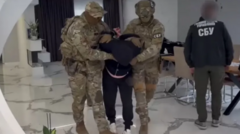As Ukraine grapples with recent Russian attacks, President Zelensky is set to deliver a counterproposal to President Trump, hinting at possible compromise yet major hurdles remain.
Ukrainian Peace Proposal Emerges Amid Ongoing Conflict

Ukrainian Peace Proposal Emerges Amid Ongoing Conflict
Kyiv presents a new plan that offers room for negotiation but leaves key issues unresolved.
In light of a controversial White House initiative aimed at resolving the ongoing war with Russia, Ukrainian officials have unveiled their own peace proposal, aiming to balance concessions with solid security assurances. The plan, outlined in details shared with The New York Times, proposes no limitations on the size of Ukraine's military and recommends the establishment of a "European security contingent," supported by the United States, on Ukrainian soil. Furthermore, it calls for the utilization of frozen Russian assets to aid in the reconstruction of war-torn areas in Ukraine.
However, some elements may be non-negotiable for the Kremlin. Notably, the Ukrainian strategy does not categorically demand full territorial restitution from Russia or insist on NATO membership—traditionally sensitive issues for Ukraine’s leadership. This openness to compromise could signal potential pathways for dialogue amid the ongoing strife.
Currently, President Trump is in Rome for Pope Francis's funeral, an event that Zelensky initially planned to attend, contingent on the latest developments in Ukraine. Following recent escalations that resulted in multiple casualties, Zelensky's participation remains uncertain. Upon landing in Rome, Trump remarked that both nations seemed "very close to a deal" and encouraged direct engagement to finalize it.
A senior Ukrainian official disclosed, under anonymity, that should Zelensky travel to Rome, he might seize the opportunity to personally convey Ukraine’s counterproposal to Trump. The Ukrainian leader expressed optimistic sentiments about impending significant discussions, stating, "In the coming days, very significant meetings may take place — meetings that should bring us closer to silence for Ukraine,” presenting a markedly upbeat outlook amidst turbulent circumstances.
However, some elements may be non-negotiable for the Kremlin. Notably, the Ukrainian strategy does not categorically demand full territorial restitution from Russia or insist on NATO membership—traditionally sensitive issues for Ukraine’s leadership. This openness to compromise could signal potential pathways for dialogue amid the ongoing strife.
Currently, President Trump is in Rome for Pope Francis's funeral, an event that Zelensky initially planned to attend, contingent on the latest developments in Ukraine. Following recent escalations that resulted in multiple casualties, Zelensky's participation remains uncertain. Upon landing in Rome, Trump remarked that both nations seemed "very close to a deal" and encouraged direct engagement to finalize it.
A senior Ukrainian official disclosed, under anonymity, that should Zelensky travel to Rome, he might seize the opportunity to personally convey Ukraine’s counterproposal to Trump. The Ukrainian leader expressed optimistic sentiments about impending significant discussions, stating, "In the coming days, very significant meetings may take place — meetings that should bring us closer to silence for Ukraine,” presenting a markedly upbeat outlook amidst turbulent circumstances.





















